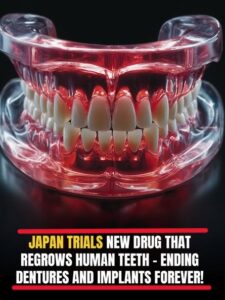The End of Tooth Loss?

Japanese Scientists Might Have Just Revolutionized Dentistry
Tooth loss has plagued humanity for as long as we’ve existed. Cavities, gum disease, injuries, and the natural wear of aging have left countless people relying on dentures, bridges, or implants. But a groundbreaking discovery from Japan hints at a future where we may never need prosthetic teeth again—because our own bodies could regrow them.
A Drug That Wakes Up Hidden Teeth
Dr. Katsu Takahashi and his team at the Medical Research Institute of Kitano Hospital have been working on a drug that could make the impossible possible: regrowing natural human teeth.
The science behind it revolves around a protein called USAG-1, which normally prevents the body from producing more than two sets of teeth (baby teeth and permanent teeth). By blocking this protein, the researchers discovered they could reactivate dormant “tooth buds”—cell clusters quietly embedded in the jaw.
In experiments with mice, the drug triggered these buds to awaken and grow into fully functional teeth. Tests on ferrets, whose dental makeup is closer to ours, produced equally promising results.
This suggests humans may still carry the biological blueprint for a third generation of teeth, much like sharks or elephants, which naturally regenerate new sets throughout their lives.
From Lab Breakthrough to Real-World Dentistry
The next step is to test the drug on humans. Clinical trials are expected to begin soon, with hopes that the treatment could reach patients as early as 2030.
If successful, the implications are enormous:
-
People who lose teeth due to decay or injury could grow new ones naturally.
-
Children born with missing teeth could finally develop a full, healthy set.
-
Elderly individuals could keep their natural chewing ability and smiles well into their later years.
Instead of invasive dental surgeries and artificial replacements, the body itself could provide the cure.
More Than Just Teeth
For Dr. Takahashi, this isn’t merely a dental innovation—it’s a way to transform lives. Tooth loss affects more than appearance; it impacts nutrition, speech, confidence, and long-term health. A simple drug that encourages regrowth could remove decades of stigma and suffering.
Of course, hurdles remain. Scientists must confirm the drug’s safety, determine the right dosage, and prove its effectiveness across different patient groups. But if these challenges are overcome, this treatment could mark the beginning of a new era in regenerative medicine—one where teeth are only the start, and organs or tissues may follow.
Within the next decade, “going to the dentist” may no longer mean drilling, implants, or dentures. Instead, it could mean unlocking the natural power your body already holds.